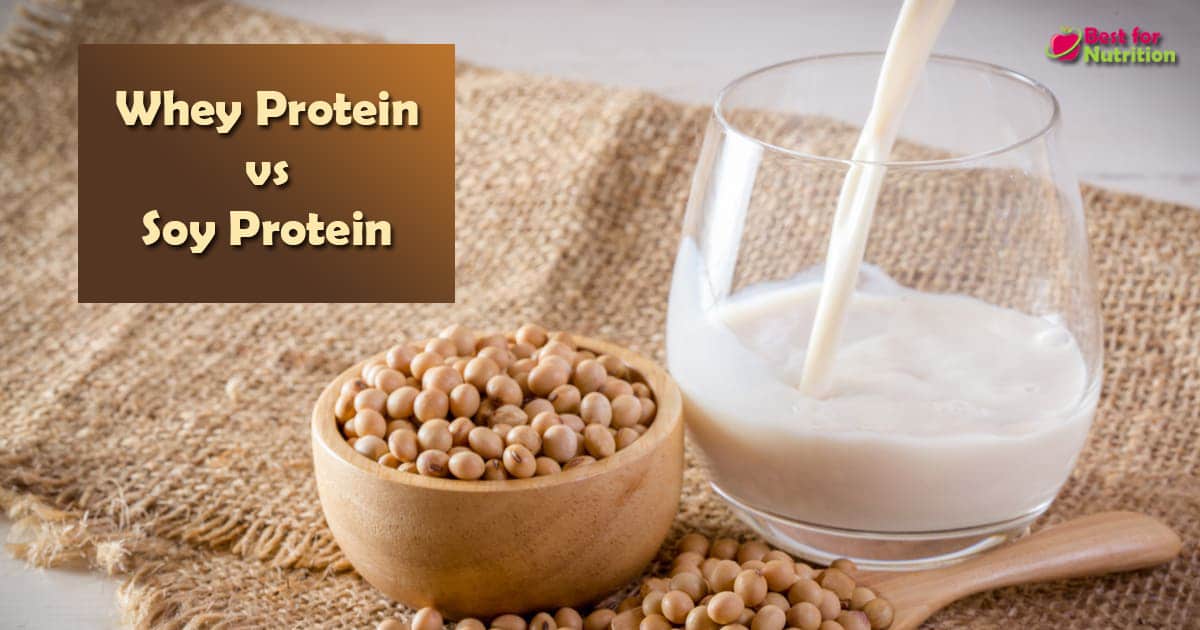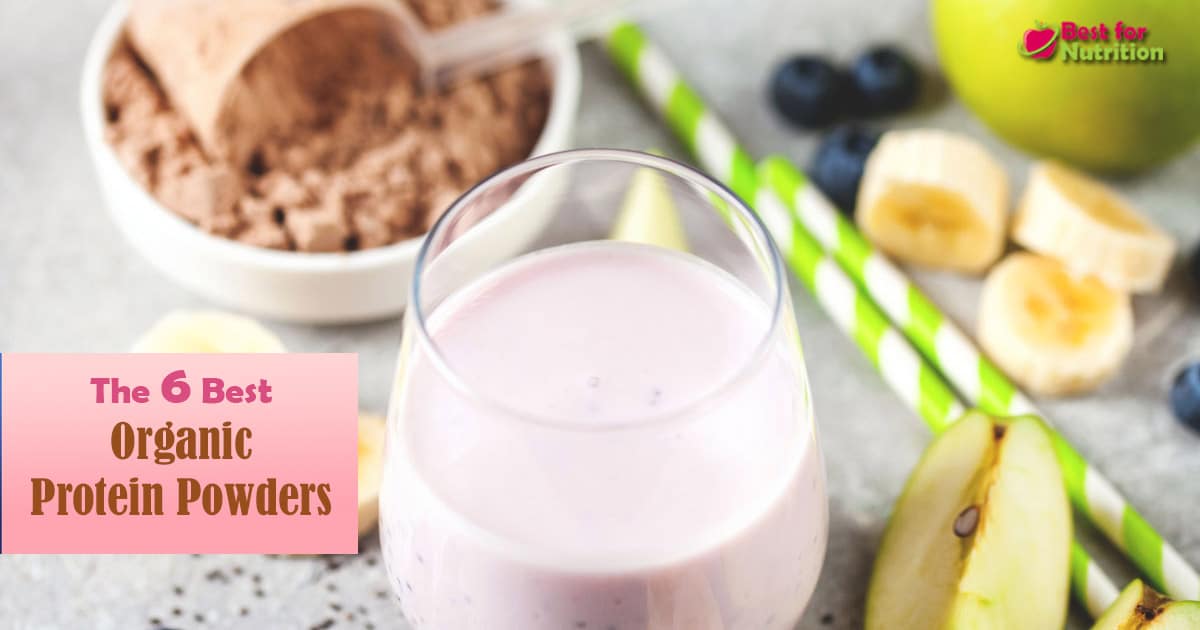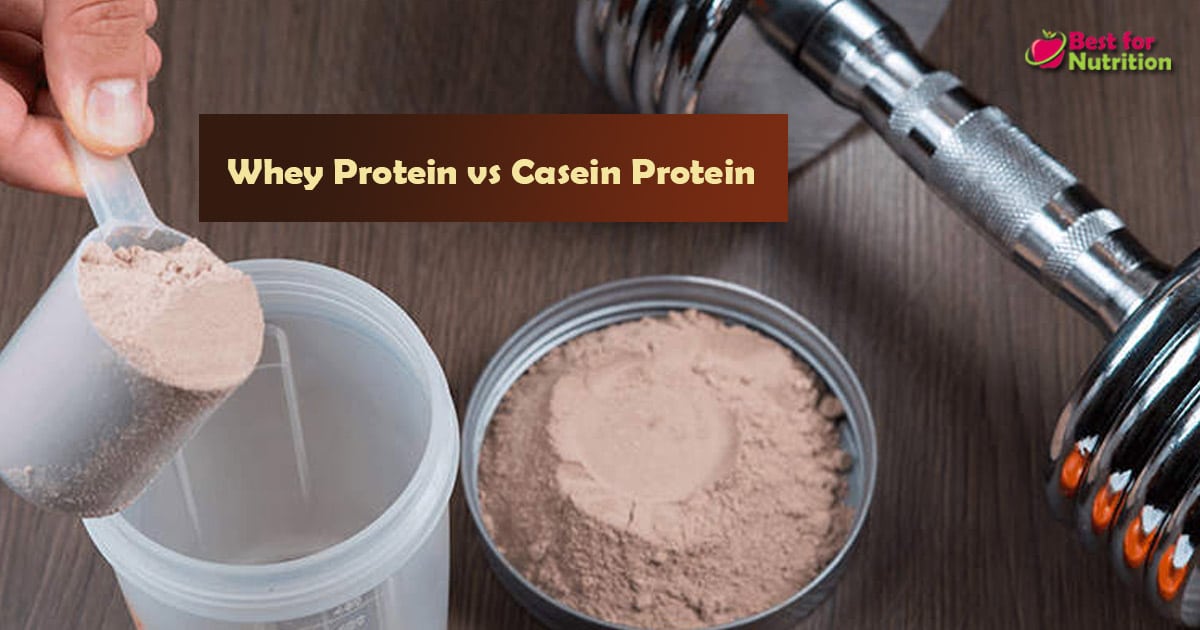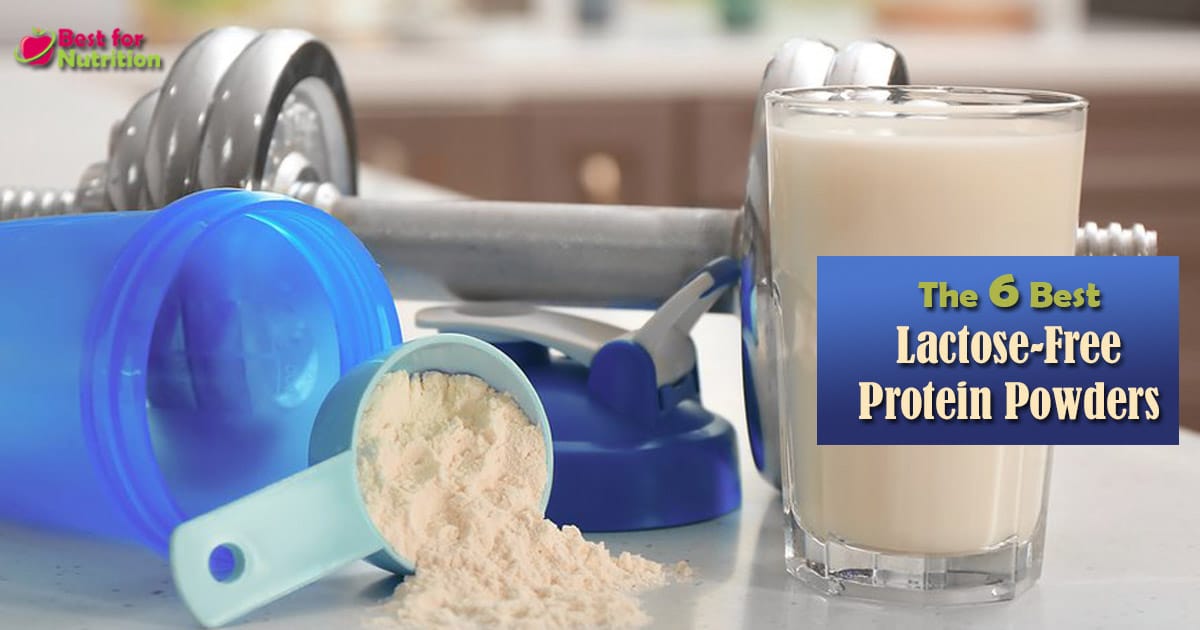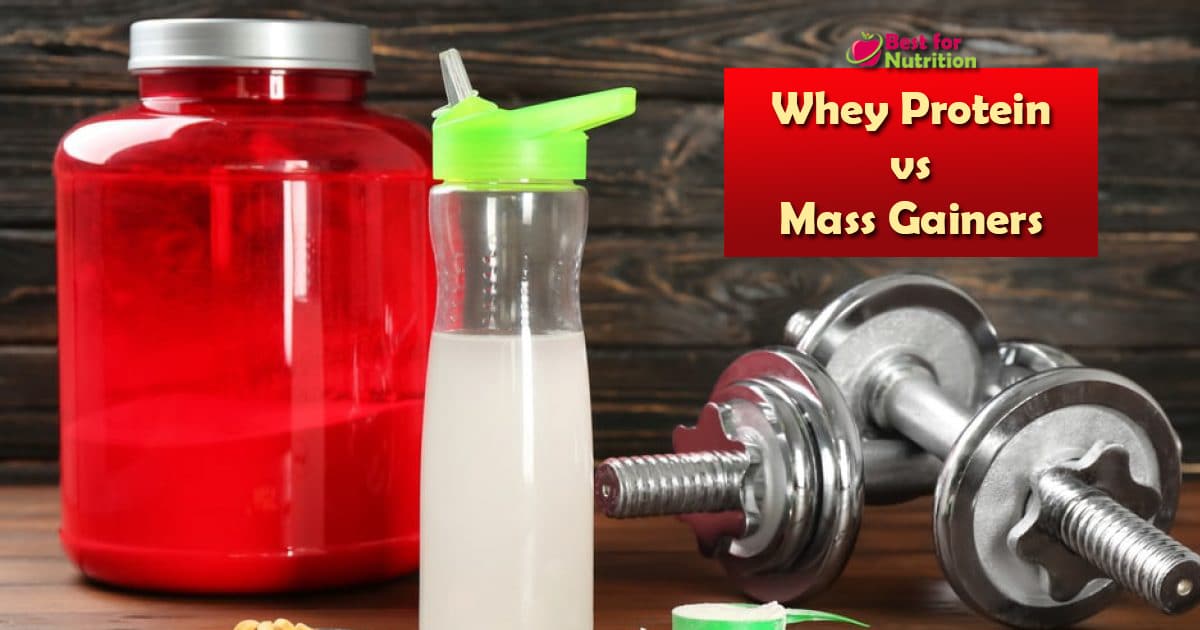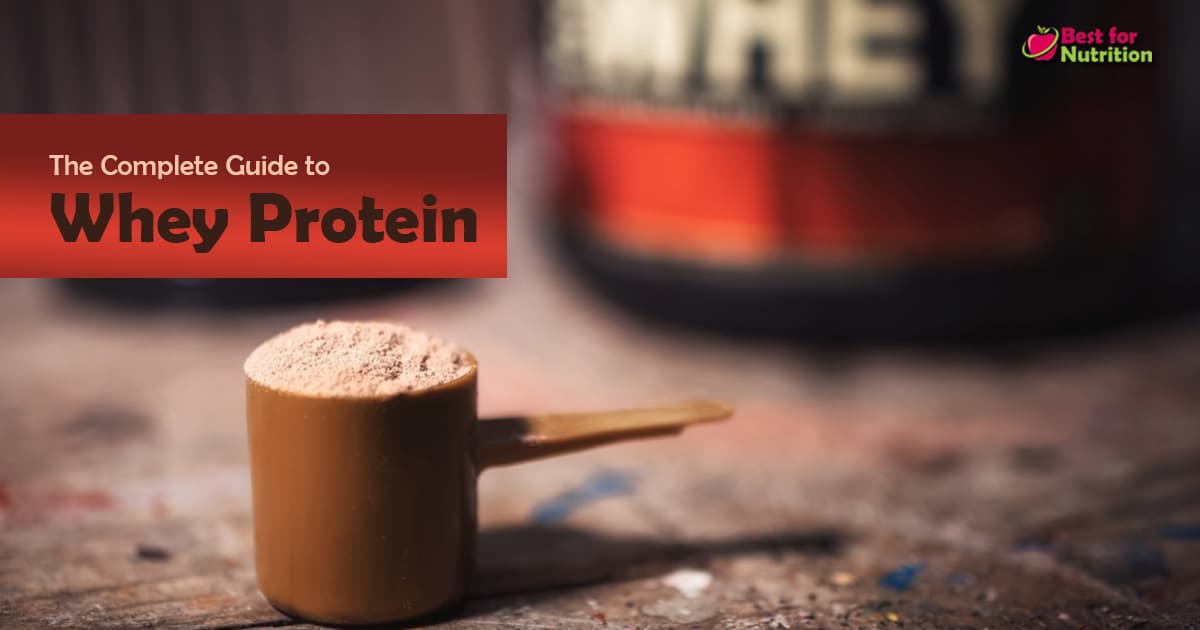Although whey protein does rule the roost when it comes to protein supplements in the market, there are a lot more choices out there for those who are lactose-intolerant or vegan.
In terms of quality and convenience of use, pea protein is on par with whey. But there are a lot of differences between the two, from their amino acid profile to the taste and digestibility.
Find out the mechanisms by which these two proteins work to benefit your health and fitness needs. This will help you choose the right one to meet your requirements.
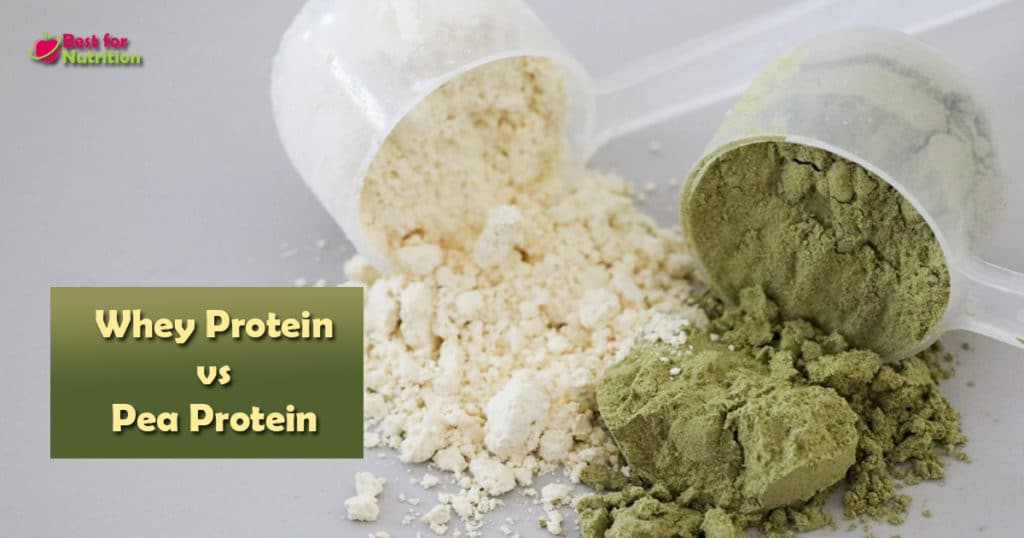
What is Whey Protein?
Cow’s milk contains two types of proteins, mainly casein and whey. Whey constitutes 20 percent of cow’s milk (1).
It is the liquid part of milk that is separated when milk is curdled. This is mainly seen during the cheese-making process when the whey separates from the curd (2). Whey contains all the essential amino acids that are needed by the body to function and therefore known as complete proteins (3).
Whey has the highest proportion of branched-chain amino acids (BCAAs), especially leucine as compared to the other protein supplement (4). Whey can be rapidly digested in the body and has all the properties aiming at maximizing muscle recovery and adaptation to resistance training (5).
It also contains bioactive compounds such as beta-lactoglobulin, serum albumin, and immunoglobulins which have several health benefits (6). They are high in calcium, potassium, and vitamins such as cobalamin and folic acid (7), (8), (9).
Whey goes through several steps of processing and is developed into whey protein powder. On the basis of the filtration process, whey can be divided into three forms: Whey Protein Concentrate, Whey Protein Isolate, and Whey Protein Hydrolysate.
Summary: Whey protein is a milk protein that contains all the essential amino acids including BCAAs which augment muscle protein synthesis (MPS). depending on processing, they come in three different forms giving varying percentages of protein.
What is Pea Protein?
Pea protein powder is made from extracting protein of ground yellow peas. Like whey, pea-protein also contains all the nine essential amino acids that need to be obtained from food (10). Your body can’t produce them on their own.
It is a great source of BCAAs – leucine, isoleucine, and valine that promotes muscle growth. High arginine present in pea protein helps in regulating blood flow and promotes muscle growth. Arginine has shown to aid in muscle conditioning (11).
Being a plant protein, it is an excellent choice for people with dietary restrictions. It is vegan friendly, gluten-free, and does not have the top eight food allergens. Therefore, a pea protein can be a great substitute to whey for people who are lactose intolerant or allergic to milk (12).
Pea powders are rich in iron, calcium, magnesium, phosphorus, and many other crucial minerals. They also blend very well in water as compared to most plant-based proteins.
Pea protein helps build muscles, keep you full, and helps lower your blood pressure and cholesterol thereby keeping your heart healthy (13), (14).
Summary: Pea protein is extracted from yellow split peas and contains all the essential amino acids. Pea protein is as good as whey in terms of muscle building. In addition to that, being a plant-protein, pea proteins can be a great choice for vegans and lactose intolerant.
Whey Protein vs Pea Protein
Here is a comparison between whey and pea protein from 12 different angles, from their nutritional profile to their digestibility and consistency.
Source
Whey protein is a milk protein that is manufactured after undergoing vigorous processing and micro filtering. Pea protein powder on the other hand is extracted from GMO-free white peas.
Needless to say, pea protein is a plant-based protein and vegan friendly. It is soy-free, gluten-free, lactose-free, nut-free, and is keto-friendly.
Summary: Whey protein is a milk protein whereas pea protein is derived from yellow peas.
Nutritional Value
Whey protein and pea protein have nearly the same protein content. In a 30g serve, they vary between 24g-27g. They both are complete proteins with all the essential amino acids that the body needs for several metabolic functions.
Summary: When compared with the total protein content of whey and pea, both are nearly similar.
Amino Acid Profile
When it comes to the amino acid profile, they show some differences. Whey protein contains more branched-chain amino acids (BCAAs), especially leucine, that are predominantly used to augment muscle protein synthesis (MPS) (15).
They make up to 66 percent of the muscle tissue. However, pea proteins are more in arginine than whey. In fact, it’s nearly three times more than whey. Even though its function is different from BCAA, arginine is essential for muscle growth as well.
When 100 grams of whey protein and pea protein supplement is compared, pea protein contains more glutamic acid and glycine than whey. Glycine helps build lean muscle mass and plays a crucial role in preventing muscle loss or muscle wasting. Glutamic acid or glutamine is important in muscle repair and growth too.
Summary: Whey contains more BCAAs than pea whereas the latter contains more arginine than whey. All these amino acids are crucial for muscle synthesis.
Calories
Whey protein and pea protein supplements have more or less similar calories. If you compare between 25 grams of pea protein with 25 grams of whey, there is not much difference in their carbohydrate content as well.
Summary: Even though the pea protein contains more calories than whey, the difference is marginal.
Health Benefits
Being a plant-protein, pea proteins have numerous health benefits that are particularly linked to plants. They lower your cholesterol, blood sugar, and help prevent cardiovascular diseases. Pea protein powder is richer in iron than whey.
However, this iron is less absorbable and can be used properly if taken in conjunction with vitamin C. Whey in contrast is packed with calcium and potassium.
Summary: Whey contains calcium and potassium whereas pea protein contains a high amount of iron which can be highly bioavailable if taken with sufficient vitamin C.
Digestibility
Compared to any other protein supplement, whey is the fastest absorbing protein. It is quickly assimilated into the body and provides instant amino acids for muscle recovery. Pea proteins like all other plant-based proteins are slow to digest.
Studies have revealed that pea protein has more satiety than whey. This is also because it is derived from yellow split peas, therefore has more soluble fiber, which is slow to digest.
Pea protein is believed to be easy on the stomach and can benefit people who have experienced bloating or gastrointestinal distress when consumed whey.
Summary: Whey is digested very fast and can provide the required amino acids instantly. Pea protein on the other hand is broken down slowly in the body.
Consistency
Both whey and pea protein easily blend in all liquids. However, whey blends to give a milk-like consistency whereas pea protein gives a much thicker mix that resembles a smoothie.
Summary: Whey and pea protein blend very well in liquid, however, pea protein gives a thicker consistency as compared to whey protein which gives a thinner one.
Taste
If no flavor is added to whey, it tastes pretty bland. There can be a slightly bitter taste as well. Unflavored pea protein tastes like a pea with a starchy aftertaste. Therefore, the manufacturer’s mostly come up with added flavors to make it tastier.
Summary: Both whey and pea supplement taste as per their original source. Some of them contain added flavors to make it tastier.
Suitability for People with Allergies
Whey protein is a milk protein that may cause gastrointestinal distress or allergic reactions in people who are lactose intolerant. Pea protein can be an ideal substitute for them.
But remember, that doesn’t instantly deduct marks from whey. These days, whey supplements such as whey isolates are available.
They are microfiltered and vigorously processed to increase their protein percentage and literally nullify any lactose. These isolates can easily be taken by lactose intolerant.
Summary: When it comes to allergies, the pea protein wins the race. It is devoid of all the 8 allergens that are marked. This makes it a great substitute for other protein powder including whey.
Bioactive Compounds
Whey contains bioactive compounds such as beta-lactoglobulin, alpha-lactalbumin, bovine serum albumin, lactoferrin, immunoglobulins to name a few, they offer specific health benefits.
They boost immunity and have high antioxidant activity. Pea proteins contain phytochemicals that possess antibacterial, antifungal, anti-inflammatory, antioxidant activities and are known to be highly active in combating many diseases.
Summary: Whey contains bioactive compounds that have certain benefits while pea protein contains phytochemicals that are strong antioxidants.
Dietary Replacements
Whey protein powder, when mixed with a liquid and blended into a shake can easily make an adequate meal replacement. Many people use water to keep the calorie low, however, you can mix it with juice or so.
Pea protein powder in comparison can’t be used instead of a full meal. They can only supplement your diet and increase the overall protein intake.
Summary: Whey can be used as a dietary supplement whereas pea protein can’t.
Help with Weight Loss
Whey protein helps you lose weight by increasing thermogenesis which leads to calorie burn (16). Like most other proteins, whey increases satiety and makes you feel full. Therefore your overall calorie intake reduces that may support your weight loss journey.
Pea protein is more effective than whey in that regard though. It normally affects two main hunger hormones, ghrelin and cholecystokinin (CCK) thereby boosting weight loss. Ghrelin is a hormone that increases appetite making you feel hungry (17).
Pea protein lowers ghrelin which in turn results in lower calorie intake. Pea protein also boosts cholecystokinin, which increases satiety (18). This helps you curb cravings and lead you to eat less.
Summary: Both whey and pea protein can help lose weight however pea protein works on the hormones responsible for appetite and diminish it.
Whey Protein vs Pea Protein: Which Protein Source is Right for You?
Complete proteins with a plant origin such as pea proteins can stand on its own when compared to whey because of its amino acid profile. It is just as effective as the whey in building muscle, keeping you full, and supporting weight loss.
Therefore, when it comes to choosing between whey and pea protein, your personal preference such as food intolerance and allergies, taste and consistency are the factors that can help you decide.
Whey has always ruled the protein supplement world because of its benefits, price, and affordability. However, pea protein is seen to provide them all plus is ideal for vegans and lactose intolerants.
Therefore, both are good for you and can provide sufficient protein for your needs. It is up to you to decide what suits you better.
Summary: Both whey and pea protein are excellent supplements that can successfully support strenuous exercise and help build muscles. Therefore, personal preferences, choices, tastes, and price should be taken into consideration before deciding.
Frequently Asked Questions (FAQ)
Can you build muscle with pea protein?
You can definitely build muscles with pea protein. It contains all the nine essential amino acids including BCAAs. So when paired with resistance training, pea protein is as effective as whey protein in muscle protein synthesis (19).
Is pea protein inflammatory?
Pea protein is not inflammatory. In fact, it is the other way round. Pea protein contains antioxidants that have been shown to decrease two main inflammatory molecules, interleukin-6 (IL-6) and tumor necrosis factor-alpha (TNF-a) (20).
Can you mix whey protein and pea protein together and use?
It is confirmed that unique combinations of protein supplements help you get a better amino acid balance and stronger effect. Whey digests faster than pea protein. Therefore, taking them together ensures that the body gets enough protein for a prolonged period of time.
The Final Note
Whey protein has always been the hero amongst all the protein supplements. It is a complete protein and has the highest amount of BCAAs, leucine, isoleucine, and valine. These BCAAs are most efficient in boosting muscle synthesis.
However, pea protein has a similar protein concentration to whey and is a complete protein in itself too. It also contains good amounts of BCAA plus certain other amino acids that promote muscle growth.
Combined with resistance training, it has proved itself more than capable. It has also proved to be beneficial in maintaining blood sugar levels and appetite. Therefore, both whey and pea protein is nearly as good as the other with little ups and downs here and there. Both can hold very well on their own. They can also be a great combination and taken together.
